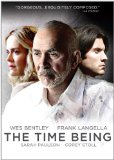| Reviews & Columns |
|
Reviews DVD TV on DVD Blu-ray 4K UHD International DVDs In Theaters Reviews by Studio Video Games Features Collector Series DVDs Easter Egg Database Interviews DVD Talk Radio Feature Articles Columns Anime Talk DVD Savant Horror DVDs The M.O.D. Squad Art House HD Talk Silent DVD
|
DVD Talk Forum |
|
|
| Resources |
|
DVD Price Search Customer Service #'s RCE Info Links |
|
Columns
|
|
|
Time Being, The
New Video // Unrated // March 11, 2014
List Price: $26.95 [Buy now and save at Amazon]
The Film:
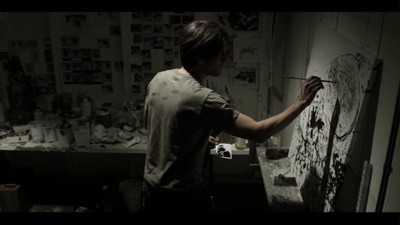 Daniel, the painter who Wes Bentley portrays in The Time Being, at first creates a series of cold, emotionally stunted artworks that aren't exactly flying off the walls at his exhibitions, something shared in common with Nenad Cicin-Sain's film itself. Each pieces that the artist creates has his blood, sweat, and tears crammed into the intricacy of their shading and quasi-realism, derived from abstract reference photos and restrained in palette to convey his desired aesthetic. Despite their beauty on the surface, however, there's something resistant and conflicting within each one, where you're able to grasp their intended purposes without feeling the gravity towards them that he'd like to deliver. The same can be said for The Time Being's exploration of troubled creatives themselves: it conveys the painter's inner turmoil as the output of his talent isn't selling and he resorts to another abstract commission to put food on his family's table, but its sparse, drab emotional tempo and muddled domestic drama doesn't invite others to take its musings down off the wall.
Daniel, the painter who Wes Bentley portrays in The Time Being, at first creates a series of cold, emotionally stunted artworks that aren't exactly flying off the walls at his exhibitions, something shared in common with Nenad Cicin-Sain's film itself. Each pieces that the artist creates has his blood, sweat, and tears crammed into the intricacy of their shading and quasi-realism, derived from abstract reference photos and restrained in palette to convey his desired aesthetic. Despite their beauty on the surface, however, there's something resistant and conflicting within each one, where you're able to grasp their intended purposes without feeling the gravity towards them that he'd like to deliver. The same can be said for The Time Being's exploration of troubled creatives themselves: it conveys the painter's inner turmoil as the output of his talent isn't selling and he resorts to another abstract commission to put food on his family's table, but its sparse, drab emotional tempo and muddled domestic drama doesn't invite others to take its musings down off the wall.
While struggling with the decision of whether to plug forward with his same artistic ideas or switch things up, Daniel (Bentley, There Be Dragons) accepts an offer from one of his sparse patrons to hand-deliver the work that the man purchased, hopefully suggesting that the buyer might be interested in other commissions. This ends up being true, but not in the way Daniel was expecting: Warner Dax (Frank Langella, Robot and Frank), an elderly dealer in vague commodities with a sharp, chilly attitude, asks him to videotape a specific sunset at a certain time and place. Daniel cautiously accepts out of financial desperation, despite cinematography not being his profession, which starts a series of jobs that escalate in their obscurity,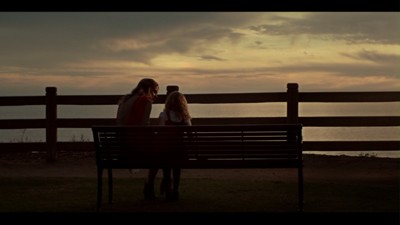 eventually moving to shots of children playing on a jungle gym and of a museum. This also pulls the artist away from his other work and his part-time gig at an art-supply store, leading to an odd focus on Warner's agenda as his other responsibilities -- namely as a husband and father -- quickly degenerate with his new documentarian position.
eventually moving to shots of children playing on a jungle gym and of a museum. This also pulls the artist away from his other work and his part-time gig at an art-supply store, leading to an odd focus on Warner's agenda as his other responsibilities -- namely as a husband and father -- quickly degenerate with his new documentarian position.
If The Time Being were judged purely on its visual merits -- its encapsulation of a voyeuristic approach to the artist's struggle -- then it would be a considerably more successful film. Distanced shots from Daniel's painting spaces capture the fluctuations in his composure as he operates within them, while close-ups on Wes Bentley's inherently concerned and despondent features create absorbing images as he doles out globs of paint to be stroked, mixed, and dabbled. The cinematography's composition also tries to express the mental state of the characters outside of Daniel's work areas, from shots of his wife reflected in mirrors and in the shower to Warner's detachment in the confines of his home. Criss-crossing phone lines, ripples in bodies of water, and rays of sunlight peeking out from clouds are all engaging to the eyes, brushing against the idea of a painter's perspective being reawakened through unlikely circumstances. This visual potency ends up playing a key role in the film's grand, effectively melodramatic apex, once it's revealed how Warner ultimately uses the footage that Daniel captures.
When placed alongside the script for The Time Being, however, its imagery rings hollow against the film's dour and lethargic exploration of art and the artist's psyche, coming across as emotionally static and lacking the substance to support its otherwise admirable intentions. Despite a low-rumbling performance from Frank Langella that attempts to elevate the film's pathos, the old man's demanding bitterness never feels justified as he continues to ask Daniel to reach beyond his comfort zone. The reasons behind his isolation and motivation towards asking this painter to capture specific things outside his house is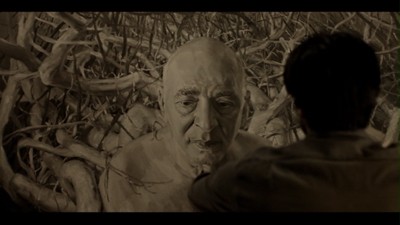 entirely unsurprising and more than a little dramatically rigid, thus causing the film's flickers of mystery to slump about halfway through. Alongside that, Daniel's life seems to spiral out of control entirely too quickly during his short, broken-up handful of commissions for Warner, serving only to escalate the drama -- bringing the artist closer to a state of solitude, a theme discussed between he and Warner -- without the rationality to back them up.
entirely unsurprising and more than a little dramatically rigid, thus causing the film's flickers of mystery to slump about halfway through. Alongside that, Daniel's life seems to spiral out of control entirely too quickly during his short, broken-up handful of commissions for Warner, serving only to escalate the drama -- bringing the artist closer to a state of solitude, a theme discussed between he and Warner -- without the rationality to back them up.
At its core, The Time Being focuses on Daniel's rediscovery and restructuring of his artistic perspective in response to Warner's overarching "commission", and being trapped in that dark, inert mental space isn't something that Wes Bentley excels at. As I mentioned earlier, his quieter scenes without dialogue work well with his intense gazes and transformative facial and body expression, but his presentation of the character's stiff introverted personality and neglectful domestic inclinations detract from the film's genuineness. That may be part of his role, but he's oddly dissatisfying to watch in scenes that should reveal more emotional vigor than he's able to muster within Daniel, despite the American Beauty actor's capabilities with similar roles. It's a shame, too, because there's something faintly absorbing about seeing where the artist's paintings start and finish after his experiences with Warner, how the elderly man's underlying intentions with the footage manifest into an expression about the love for one's family. However, there's simply not enough tangible dramatic growth and too much reliance on drawn-out visual lyricism to appreciate the plunge Daniel takes across Nenad Cicin-Sain's freshman feature.
The DVD:
Video and Audio:
The crisp, tonally complex digital cinematography in The Time Being receives a fairly appealing and respectful transfer from Cinedigm, captured in a now rarely-used aspect ratio of straight 2:1. Textures abound in the digital cinematography, namely in the brush-strokes and swirled paints of the artworks on display, reacting well to the film's relatively dark lighting and constantly conveying fine details. The transfer has issues with smoothness at times, and it's easy to spot some edge halos against sharp lines of buildings and along character silhouettes in outdoor sequences. Other times, in close-ups on Wes Bentley's face and along brick walls, details are clear and without digital issues. For the most part, the film looks rather strong despite its source and resolution limitations, with skin tones that stay mindful of the film's general muted color scheme and deep blues, reds, and greens in the paintings are easy to get wrapped up in.
While the disc defaults to a 2-channel stereo option, Cinedigm have also included a far more robust and appreciable 5.1 Dolby Digital surround option for The Time Being. The differences are understated, but appreciable: the ambiance of museums and outdoor sequences employ more channel separation and more aptly fill the stage, while the subtlety of the music's moody score travels to the rear channels on a frequent basis. Verbal clarity is largely the same between the two, having some occasional audibility issues with some dialogue (a few of Frank Langella's softer-spoken sequences are difficult to understand without subs flipped on) but mostly coming out loud and clear. Effects like the snap of a camera and the mixing of paints are slight but clear, often dominated by the music but never rendered inaudible. In all, everything sounds just fine.
Special Features:
The sole special feature on this DVD comes in an Interview with Director Nenad Cicin-Sain (3:11, 16x9). While brief, it's an honest and endearing glimpse at a director who struggled to get this film made, discussing the film's themes and working with cinematographer Mihai Malaimare Jr.
Final Thoughts:
The Time Being fits in the category of films that I really wish I could appreciate more, because it's easy to see where director Nenad Cicin-Sain wants to go with its musings on artists struggling with a buyer's market and the balance between domestic and devoted creative lifestyles. As it's presented, however, despite being a virtuoso visual experience, Daniel's struggle as a painter and father in need of reawakening falls flat amid cumbersome stabs at artistic introspection and stiff, inauthentic family drama. Rent It.
Thomas Spurlin, Staff Reviewer -- DVDTalk Reviews | Personal Blog/Site
 Daniel, the painter who Wes Bentley portrays in The Time Being, at first creates a series of cold, emotionally stunted artworks that aren't exactly flying off the walls at his exhibitions, something shared in common with Nenad Cicin-Sain's film itself. Each pieces that the artist creates has his blood, sweat, and tears crammed into the intricacy of their shading and quasi-realism, derived from abstract reference photos and restrained in palette to convey his desired aesthetic. Despite their beauty on the surface, however, there's something resistant and conflicting within each one, where you're able to grasp their intended purposes without feeling the gravity towards them that he'd like to deliver. The same can be said for The Time Being's exploration of troubled creatives themselves: it conveys the painter's inner turmoil as the output of his talent isn't selling and he resorts to another abstract commission to put food on his family's table, but its sparse, drab emotional tempo and muddled domestic drama doesn't invite others to take its musings down off the wall.
Daniel, the painter who Wes Bentley portrays in The Time Being, at first creates a series of cold, emotionally stunted artworks that aren't exactly flying off the walls at his exhibitions, something shared in common with Nenad Cicin-Sain's film itself. Each pieces that the artist creates has his blood, sweat, and tears crammed into the intricacy of their shading and quasi-realism, derived from abstract reference photos and restrained in palette to convey his desired aesthetic. Despite their beauty on the surface, however, there's something resistant and conflicting within each one, where you're able to grasp their intended purposes without feeling the gravity towards them that he'd like to deliver. The same can be said for The Time Being's exploration of troubled creatives themselves: it conveys the painter's inner turmoil as the output of his talent isn't selling and he resorts to another abstract commission to put food on his family's table, but its sparse, drab emotional tempo and muddled domestic drama doesn't invite others to take its musings down off the wall. While struggling with the decision of whether to plug forward with his same artistic ideas or switch things up, Daniel (Bentley, There Be Dragons) accepts an offer from one of his sparse patrons to hand-deliver the work that the man purchased, hopefully suggesting that the buyer might be interested in other commissions. This ends up being true, but not in the way Daniel was expecting: Warner Dax (Frank Langella, Robot and Frank), an elderly dealer in vague commodities with a sharp, chilly attitude, asks him to videotape a specific sunset at a certain time and place. Daniel cautiously accepts out of financial desperation, despite cinematography not being his profession, which starts a series of jobs that escalate in their obscurity,
 eventually moving to shots of children playing on a jungle gym and of a museum. This also pulls the artist away from his other work and his part-time gig at an art-supply store, leading to an odd focus on Warner's agenda as his other responsibilities -- namely as a husband and father -- quickly degenerate with his new documentarian position.
eventually moving to shots of children playing on a jungle gym and of a museum. This also pulls the artist away from his other work and his part-time gig at an art-supply store, leading to an odd focus on Warner's agenda as his other responsibilities -- namely as a husband and father -- quickly degenerate with his new documentarian position. If The Time Being were judged purely on its visual merits -- its encapsulation of a voyeuristic approach to the artist's struggle -- then it would be a considerably more successful film. Distanced shots from Daniel's painting spaces capture the fluctuations in his composure as he operates within them, while close-ups on Wes Bentley's inherently concerned and despondent features create absorbing images as he doles out globs of paint to be stroked, mixed, and dabbled. The cinematography's composition also tries to express the mental state of the characters outside of Daniel's work areas, from shots of his wife reflected in mirrors and in the shower to Warner's detachment in the confines of his home. Criss-crossing phone lines, ripples in bodies of water, and rays of sunlight peeking out from clouds are all engaging to the eyes, brushing against the idea of a painter's perspective being reawakened through unlikely circumstances. This visual potency ends up playing a key role in the film's grand, effectively melodramatic apex, once it's revealed how Warner ultimately uses the footage that Daniel captures.
When placed alongside the script for The Time Being, however, its imagery rings hollow against the film's dour and lethargic exploration of art and the artist's psyche, coming across as emotionally static and lacking the substance to support its otherwise admirable intentions. Despite a low-rumbling performance from Frank Langella that attempts to elevate the film's pathos, the old man's demanding bitterness never feels justified as he continues to ask Daniel to reach beyond his comfort zone. The reasons behind his isolation and motivation towards asking this painter to capture specific things outside his house is
 entirely unsurprising and more than a little dramatically rigid, thus causing the film's flickers of mystery to slump about halfway through. Alongside that, Daniel's life seems to spiral out of control entirely too quickly during his short, broken-up handful of commissions for Warner, serving only to escalate the drama -- bringing the artist closer to a state of solitude, a theme discussed between he and Warner -- without the rationality to back them up.
entirely unsurprising and more than a little dramatically rigid, thus causing the film's flickers of mystery to slump about halfway through. Alongside that, Daniel's life seems to spiral out of control entirely too quickly during his short, broken-up handful of commissions for Warner, serving only to escalate the drama -- bringing the artist closer to a state of solitude, a theme discussed between he and Warner -- without the rationality to back them up. At its core, The Time Being focuses on Daniel's rediscovery and restructuring of his artistic perspective in response to Warner's overarching "commission", and being trapped in that dark, inert mental space isn't something that Wes Bentley excels at. As I mentioned earlier, his quieter scenes without dialogue work well with his intense gazes and transformative facial and body expression, but his presentation of the character's stiff introverted personality and neglectful domestic inclinations detract from the film's genuineness. That may be part of his role, but he's oddly dissatisfying to watch in scenes that should reveal more emotional vigor than he's able to muster within Daniel, despite the American Beauty actor's capabilities with similar roles. It's a shame, too, because there's something faintly absorbing about seeing where the artist's paintings start and finish after his experiences with Warner, how the elderly man's underlying intentions with the footage manifest into an expression about the love for one's family. However, there's simply not enough tangible dramatic growth and too much reliance on drawn-out visual lyricism to appreciate the plunge Daniel takes across Nenad Cicin-Sain's freshman feature.
The DVD:
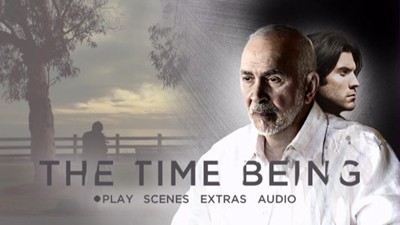 | 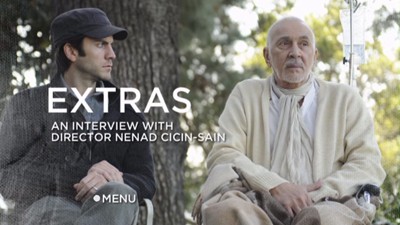 |
Video and Audio:
The crisp, tonally complex digital cinematography in The Time Being receives a fairly appealing and respectful transfer from Cinedigm, captured in a now rarely-used aspect ratio of straight 2:1. Textures abound in the digital cinematography, namely in the brush-strokes and swirled paints of the artworks on display, reacting well to the film's relatively dark lighting and constantly conveying fine details. The transfer has issues with smoothness at times, and it's easy to spot some edge halos against sharp lines of buildings and along character silhouettes in outdoor sequences. Other times, in close-ups on Wes Bentley's face and along brick walls, details are clear and without digital issues. For the most part, the film looks rather strong despite its source and resolution limitations, with skin tones that stay mindful of the film's general muted color scheme and deep blues, reds, and greens in the paintings are easy to get wrapped up in.
While the disc defaults to a 2-channel stereo option, Cinedigm have also included a far more robust and appreciable 5.1 Dolby Digital surround option for The Time Being. The differences are understated, but appreciable: the ambiance of museums and outdoor sequences employ more channel separation and more aptly fill the stage, while the subtlety of the music's moody score travels to the rear channels on a frequent basis. Verbal clarity is largely the same between the two, having some occasional audibility issues with some dialogue (a few of Frank Langella's softer-spoken sequences are difficult to understand without subs flipped on) but mostly coming out loud and clear. Effects like the snap of a camera and the mixing of paints are slight but clear, often dominated by the music but never rendered inaudible. In all, everything sounds just fine.
Special Features:
The sole special feature on this DVD comes in an Interview with Director Nenad Cicin-Sain (3:11, 16x9). While brief, it's an honest and endearing glimpse at a director who struggled to get this film made, discussing the film's themes and working with cinematographer Mihai Malaimare Jr.
Final Thoughts:
The Time Being fits in the category of films that I really wish I could appreciate more, because it's easy to see where director Nenad Cicin-Sain wants to go with its musings on artists struggling with a buyer's market and the balance between domestic and devoted creative lifestyles. As it's presented, however, despite being a virtuoso visual experience, Daniel's struggle as a painter and father in need of reawakening falls flat amid cumbersome stabs at artistic introspection and stiff, inauthentic family drama. Rent It.
|
| Popular Reviews |
| Sponsored Links |
|
|
| Sponsored Links |
|
|
| Release List | Reviews | Shop | Newsletter | Forum | DVD Giveaways | Blu-Ray | Advertise |
|
Copyright 2024 DVDTalk.com All Rights Reserved. Legal Info, Privacy Policy, Terms of Use,
Manage Preferences,
Your Privacy Choices | |||||||









